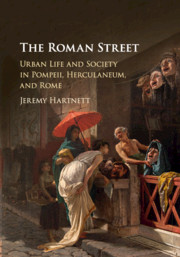Book contents
- Frontmatter
- Contents
- List of Color Plates
- List of Illustrations
- List of Tables
- Acknowledgments
- Introduction
- Part I Repopulating the Street
- 1 Street Forms, Street Movements
- 2 Life In The Street
- 3 The Street's Social Environment
- Part II The Street and Its Architectural Border
- Part III The Street in Microcosm
- Epilogue
- Bibliography
- Index
- Plate section
3 - The Street's Social Environment
from Part I - Repopulating the Street
Published online by Cambridge University Press: 27 April 2017
- Frontmatter
- Contents
- List of Color Plates
- List of Illustrations
- List of Tables
- Acknowledgments
- Introduction
- Part I Repopulating the Street
- 1 Street Forms, Street Movements
- 2 Life In The Street
- 3 The Street's Social Environment
- Part II The Street and Its Architectural Border
- Part III The Street in Microcosm
- Epilogue
- Bibliography
- Index
- Plate section
Summary
IN JUVENAL'S FIRST SATIRE, HE ENTERTAINS THE QUESTION OF WHY one should write satire. His answer is that it is difficult not to do so, given the absurdities he witnesses. Eunuchs get married, upright women hunt boars in the amphitheater, a barber gains unfathomable riches, an Egyptian dons purple and gold – such events fuel Juvenal's determination to join the ranks of poets. Who has the patience and iron-strong will to keep his temper, Juvenal asks, amid a wicked city? A collage of scenes follows. A blubbery lawyer alone weighs down a brand-new litter built for two. Along comes an informer who has made a mint striking fear into (and thus extorting) the aristocracy. You are bumped aside by those who earn bequests by bedding rich old hags. Regular folk get jostled by the sycophants surrounding a guardian who has robbed his ward. Why mess about with typical poet stuff – myth and all its characters – Juvenal asks, when a man prostitutes his wife and pockets the money, or when a young man races down the Via Flaminia like Achilles's charioteer after he has blown his family's fortune on horses and then wants to command a cohort?
For our purposes, what is striking about Juvenal's portrait is not so much its viciousness – fourteen equally spleenful satires still await – as its directness about where one sees the outrages of Roman society. As his examples come to a head in this programmatic overture, Juvenal gets specific about location: “Wouldn't it be possible to fill a whole notebook while you're standing at the street corner?” Two final street scenes follow: six men bear an open litter carrying a fellow who got rich by forging documents, and a distinguished lady who has poisoned her husband walks unabashed behind his bier. Like their predecessors, these examples hinge on a shared pair of characteristics of the street: first, it is a place to observe all of society. Juvenal fills the space with everyone from the humiliated populus to the cold-hearted matron. Second, he sees them as they wish to be seen. The outrages to which Juvenal bears witness are products of streetgoers’ efforts to posture here – through what they wear, ride, or drive; through their domination of the thoroughfare; or through their ability to keep up appearances despite common knowledge of their transgressions.
- Type
- Chapter
- Information
- The Roman StreetUrban Life and Society in Pompeii, Herculaneum, and Rome, pp. 76 - 112Publisher: Cambridge University PressPrint publication year: 2017



